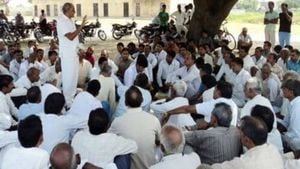The tragic case of Atul Subhash, a 34-year-old tech executive who took his own life, has thrown light on deeply concerning issues surrounding marital strife, alleged harassment, and the dynamics of domestic violence accusations. Subhash was found dead at his Bengaluru home, leaving behind a 24-page suicide note and a nearly 90-minute video documenting his torment and the pressures he faced from his estranged wife, Nikita Singhania, and her family.
Subhash's suicide occurred on December 9 and has ignited widespread attention and outrage. His suicide note accused Singhania and her relatives of harassment, extortion, and causing him intense mental anguish, stemming from demands related to their separation and custody of their son. Subhash claimed his wife’s family demanded ₹3 crore for her to withdraw legal cases against him and ₹3 lakh merely to see their son.
The suicide note began with the phrase 'Justice is due', underscoring Subhash’s frustrations with what he viewed as systemic injustices against men facing allegations from women. Many have commented on the tragic nature of his situation, arguing it reflects how men also suffer under the weight of familial and marital pressures, leading to devastating outcomes.
Shortly after Subhash's death, the Bengaluru police filed a First Information Report (FIR) against Nikita, her mother Nisha, and brother Anurag for abetment of suicide. They were reportedly evasive, changing their locations frequently to evade police capture. This evasion came after news of the police investigation broke, causing them to lock their home in Jaunpur, Uttar Pradesh.
According to police sources, they attempted to locate Singhania and her family with limited success, as they only communicated through WhatsApp. But their luck ran out due to one misstep—Nikita's accidental phone call to a relative which led the police to track their location successfully. They arrested her from her PG accommodation in Gurugram, with her family apprehended shortly thereafter.
During the police's investigation, inquiries have revealed the psychological struggle faced by Subhash. He had previously sought legal remedies against the allegations made by Nikita, who accused him of dowry harassment and assault. Subhash, on the other hand, described harrowing experiences, alleging she had filed numerous cases against him, including grave charges involving murder threats and unnatural sex. He claimed these accusations were entirely untrue, serving instead as instruments of leverage for his wife’s family's monetary demands.
Upon his arrest, Nikita denied the claims of harassment, asserting instead she was the one mistreated during their marriage. She maintained they had been living separately for three years, casting doubt on Subhash's allegations of extortion. Her viewpoint has introduced complications to the investigation as both sides attempt to navigate their respective narratives.
Following their detention, the family was brought before the court, where they were remanded to 14 days of judicial custody. Nikita's uncle, Sushil Singhania, initially attempted to secure anticipatory bail. The Allahabad High Court granted him pre-arrest bail shortly after, emphasizing the differences between harassment claims and actual involvement in Subhash's tragic death.
An initial hearing revealed concerns over the handling of domestic disputes. Supporters of Subhash have highlighted the potential biases inherent within the judicial system, particularly pointing out allegations of corruption, including claims made by Subhash about bribes demanded from him to settle his cases. The disturbing narratives have resulted in calls for enhanced scrutiny and discussion on male suicide rates linked to domestic disputes.
Atul's family, particularly his father and brother, have expressed deep concerns over the welfare of his four-year-old son, who has been entrusted to relatives amid the legal chaos. The family fears for the child’s safety and emotional well-being, constantly seeking clarity on his whereabouts and living conditions. "Our biggest concern right now is about my nephew," his brother expressed, reflecting the anguish the family continues to face post-tragedy.
The developments surrounding Atul Subhash's death and the legal battles his family faces necessitate urgent discussions over community attitudes toward domestic violence, marital disputes, and mental health. The suicide shines light on the often-overlooked issue of male victimization, pressing societal change and reform within the judicial system to create equitable solutions for both genders.
With public sentiment swaying toward justice and contemplation of Atul’s suffering, his case serves as both a cautionary tale and a summoning for progress within the societal structures surrounding marriage and domestic squabbles. Only time will reveal whether greater change will come from the fallout of such tragedies or if pain’s cyclic nature will persist unchallenged.



